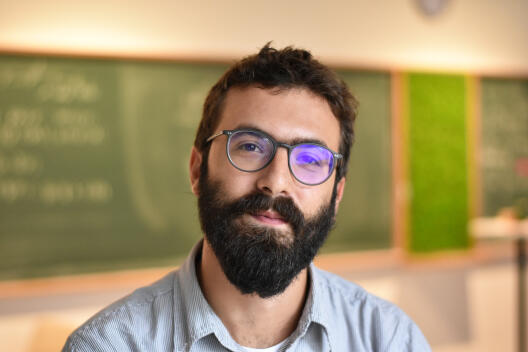Cluster postdoc successfully publishes in the top journal "Inventiones mathematicae"

The journal "Inventiones mathematicae" is considered a top journal in the mathematical community. Therefore, it is a special delight when the work of a young scientist from our Cluster is accepted for publication there. This year, the journal published a paper by postdoc Dr. Konstantinos Zemas and his PhD supervisor Prof. Dr. Stephan Luckhaus (University of Leipzig). In this interview, Konstantinos talks about the content of the paper, which is based on his PhD thesis, and how the topic and his research have developed since the publication.
"Rigidity estimates for isometric and conformal maps from $S^{n-1}$ to $R^n$", in Inventiones mathematicae, Vol. 230, Issue 1 (2022), 375-461.
Kostas, could you please describe the general research area your paper contributed to?
The general topic is Calculus of Variations, in particular the investigation of quantitative rigidity properties related to differential inclusions and geometric variational problems, which has been a very active research field over the past few decades. Such questions do not only have an inherent geometric interest but often also profound applications in mathematical models of materials science.
What does your result mean for your research area?
In our work, we obtained linear and nonlinear stability results for rigid motions (resp. Möbius transformations) among Sobolev maps, from $S^{n-1}$ into $R^n$.
The innovation of our contribution lies in the fact that in this more flexible setting not only an isometric (resp. conformal) deficit is necessary in order to obtain stability, but also a deficit measuring the distortion of $S^{n-1}$ under the maps in consideration. This was introduced as an associated isoperimetric type of deficit.
We hope that several ideas and techniques that are developed in the paper will also be useful in other situations as a lot of interesting questions have stemmed from our work and general discussions.
How has the topic of the paper developed since then? Are you still working on it?
Together with Stephan Luckhaus, we plan to continue on the quest for quantitative rigidity results for Lie groups with a significant geometric/physical meaning, such as the conformal group and also the restricted Lorentz group, which has prominent appearance in Lorentzian geometry, relativistic physics and electromagnetism.
What further projects are you currently working on?
During the last two years in Münster I have continued to work on rigidity but also homogenization issues of energies related to problems in continuum/fracture mechanics and materials science. In the process, I have established fruitful collaborations with former and current researchers from the Cluster, such as Manuel Friedrich, Leonard Kreutz and Caterina Zeppieri.
Thank you very much for the interview and good luck with your further research!
About Dr. Konstantinos Zemas
Konstantinos Zemas completed his bachelor’s degree in mathematics at the University of Athens and his master’s degree at the Free University of Berlin as a member of the Berlin Mathematical School. As a PhD student, he wrote his thesis at the Graduate School of the Max Planck Institute for Mathematics in the Sciences and the University of Leipzig. After completing his doctorate in 2020, he became a postdoc at the Institute for Analysis and Numerics at the University of Münster in the research groups for Calculus of Variations and Analysis and Modelling. He is currently a member of the Cluster of Excellence Mathematics Münster.

